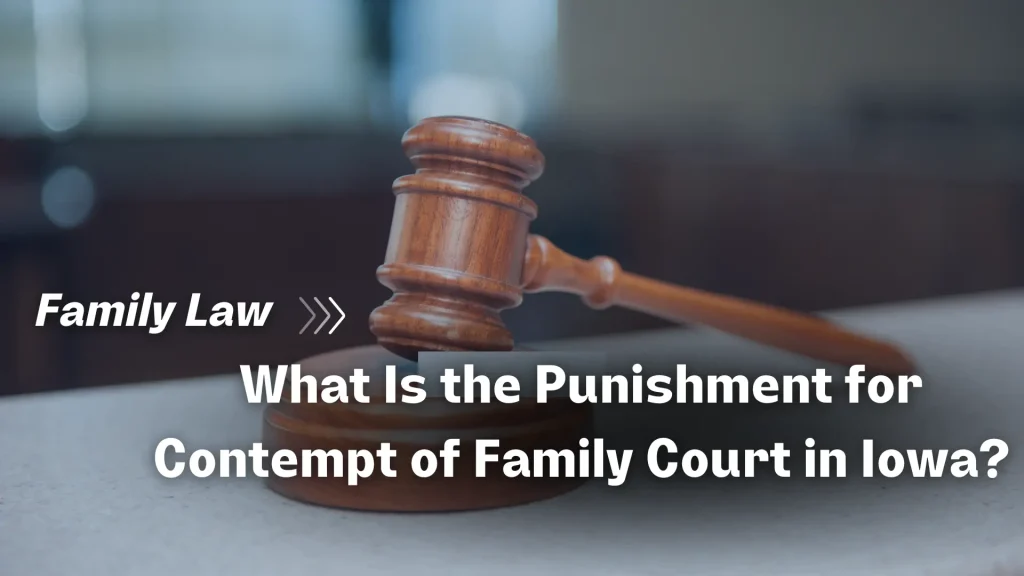
When a court issues an order regarding child custody or visitation in Iowa, it is legally binding. Both parties must comply. Unfortunately, disputes sometimes arise when one parent fails to follow the terms set by the court. When this happens, the offending parent may be found in contempt of court. Understanding what contempt of family court entails and the potential punishments can help parents navigate these difficult situations.
What Is Contempt of Family Court?
Contempt of court occurs when one party willfully disobeys a court order. In family law cases, this often involves child custody or visitation agreement violations. Suppose a parent refuses to allow the other parent their court-ordered visitation or fails to return the child as scheduled. Under those circumstances, they could be held in contempt.
In Iowa, the violating party’s behavior must be intentional in holding someone in contempt of family court. The court must determine that the individual knowingly and willfully disobeyed a court order. A simple misunderstanding or accidental non-compliance will not usually rise to the level of contempt cases. However, ongoing, deliberate violations of custody or visitation orders can lead to serious consequences.
How to File for Contempt of Court in Family Law Cases
If one parent believes the other has violated a child custody or visitation order, they can file an Application for Rule to Show Cause, commonly known as a contempt filing. This process brings the issue to the court’s attention, and the offending parent must explain their actions.
Once the parent files the application, the court schedules a hearing for both parties to present evidence. The court will review the evidence to determine whether the accused party intentionally violated the court order. If the court finds them in contempt, it will issue a punishment based on the severity of the violation.
Punishment for Contempt of Family Court in Iowa
When a parent is found in contempt of family court, the judge has several options for punishment. The most common forms of punishment include:
- Fines: The court may impose a monetary fine on the violating party. These fines are typically meant to discourage further violations and serve as a financial penalty for failing to comply with court orders.
- Jail Time: In more severe cases, the court may order the offending parent to serve time in jail. In Iowa, the punishment for contempt may include up to 30 days in the county jail for each violation. Since multiple violations may occur (for example, each missed visitation schedule is a separate offense), the jail time can add up quickly.
- Modification of Custody or Visitation Orders: In some cases, the court may modify the existing custody or visitation agreement to prevent further violations. For instance, if one parent continually interferes with the other’s visitation rights, the court might reduce that parent’s custodial time or change the exchange location for the child.
- Attorney Fees and Court Costs: The court often orders the parent found in contempt to pay the other party’s attorney fees and court costs. This can be a significant financial burden, especially when combined with fines or other punishments.
Additional Consequences of Being in Contempt of Family Court
In addition to the immediate penalties such as fines, jail time, or modification of orders, being found in contempt of family court can have long-term consequences. Repeated violations can damage a parent’s standing with the court, leading to more restrictive custody arrangements in the future. A parent who continually disobeys court orders may also be viewed as less cooperative, negatively impacting future custody or visitation rulings.
In extreme cases, if the violations are severe enough, the court may even consider transferring custody of the child to the other parent. This is rare but can occur when the violations seriously harm the child or significantly disrupt the other parent’s relationship with the child.
Preventing Contempt of Court in Family Law Cases
 The best way to avoid contempt of court is to comply with all court orders to the best of your ability. If circumstances change, such as job schedules or relocation, it’s important to petition the court for a modification rather than taking matters into your own hands. As discussed above, following the proper legal channels can lead to serious consequences.
The best way to avoid contempt of court is to comply with all court orders to the best of your ability. If circumstances change, such as job schedules or relocation, it’s important to petition the court for a modification rather than taking matters into your own hands. As discussed above, following the proper legal channels can lead to serious consequences.
If you are accused of being in contempt of court or need help enforcing a custody or visitation order, it’s essential to seek legal guidance from an experienced family law attorney. Arenson Law Group, PC can help you understand your options and protect your rights in these situations.
Contact Arenson Law Group, PC for Help with Contempt of Family Court Cases
Dealing with a contempt of court issue can be stressful, especially involving your children and family. Whether you need to enforce a custody order or defend against a contempt filing, Arenson Law Group, PC can provide the legal assistance you need. Contact us today at (319) 363-8199 to discuss your case and learn more about your legal options. Learn more about our team of experienced attorneys to know why you should trust our law firm.
Related Posts:
How to Get an Emergency Custody Order Tips
Become a Foster Parent Requirements